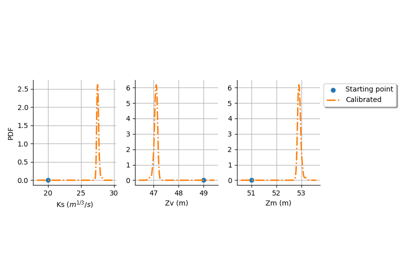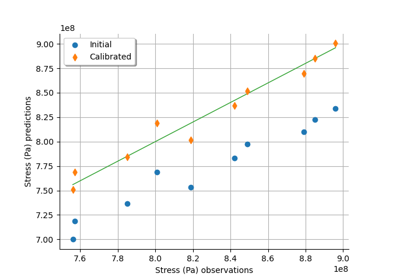GaussianLinearCalibration¶
- class GaussianLinearCalibration(*args)¶
Gaussian linear calibration algorithm.
- Available constructors:
GaussianLinearCalibration(model, inputObservations, outputObservations, parameterMean, parameterCovariance, errorCovariance, methodName)
GaussianLinearCalibration(modelObservations, gradientObservations, outputObservations, parameterMean, parameterCovariance, errorCovariance, methodName)
- Parameters:
- model
Function The parametric function to be calibrated.
- inputObservations2-d sequence of float
The sample of input observations. Can have dimension 0 to specify no observations.
- outputObservations2-d sequence of float
The sample of output observations.
- parameterMeansequence of float
The mean of the Gaussian prior distribution of the parameter.
- parameterCovariance2-d sequence of float
The covariance matrix of the Gaussian prior distribution of the parameter.
- errorCovariance2-d sequence of float
The covariance matrix of the Gaussian distribution of the observations error.
- methodNamestr
The name of the least-squares method to use for the calibration. By default, equal to QR. Possible values are SVD, QR, Cholesky.
- modelObservations2-d sequence of float
The sample of output values of the model.
- gradientObservations2-d sequence of float
The Jacobian matrix of the model with respect to the parameter.
- model
Methods
Accessor to the object's name.
Accessor to the observation error covariance.
Accessor to the flag for a global observation error covariance.
Accessor to the model gradient at the parameterMean.
Accessor to the input data to be fitted.
Accessor to the name of least-squares method used for the resolution.
getModel()Accessor to the model to be fitted.
Accessor to the model evaluation at the parameterMean.
getName()Accessor to the object's name.
Accessor to the output data to be fitted.
Accessor to the parameter prior covariance.
Accessor to the parameter parameterMean.
Accessor to the parameter prior distribution.
Get the result structure.
hasName()Test if the object is named.
run()Launch the algorithm.
setName(name)Accessor to the object's name.
setResult(result)Accessor to optimization result.
See also
Notes
This class implements the Maximum A Posteriori (MAP) estimator for a linear model under the Bayesian hypothesis that the prior and the observation errors have Gaussian distributions. This is also known as the Kalman filter.
The given observation error covariance can be either local, ie the same matrix applies for each observation and is of dimension the output dimension of the model, or global, ie the matrix describes the full set of observation errors, in which case its dimension is the product of the output dimension of the model and the number of observations.
The prior distribution of the parameter is a
Normal.The posterior distribution of the parameter is
Normal.The resulting error distribution is
Normalwith a zero mean and with a covariance matrix equal to the errorCovariance input argument.Please read Gaussian calibration for more details.
Examples
Calibrate a nonlinear model using GaussianLinearCalibration:
>>> import openturns as ot >>> ot.RandomGenerator.SetSeed(0) >>> m = 10 >>> x = [[0.5 + i] for i in range(m)] >>> inVars = ['a', 'b', 'c', 'x'] >>> formulas = ['a + b * exp(c * x)'] >>> model = ot.SymbolicFunction(inVars, formulas) >>> p_ref = [2.8, 1.2, 0.5] >>> params = [0, 1, 2] >>> modelX = ot.ParametricFunction(model, params, p_ref) >>> y = modelX(x) >>> y += ot.Normal(0.0, 0.05).getSample(m) >>> parameterMean = [1.0]*3 >>> priorCovariance = ot.CovarianceMatrix(3) >>> errorCovariance = ot.CovarianceMatrix(1, [0.1]) >>> method = 'SVD' >>> algo = ot.GaussianLinearCalibration(modelX, x, y, parameterMean, priorCovariance, errorCovariance, method) >>> algo.run() >>> print(algo.getResult().getParameterMAP()) [8.11483,0.0770992,0.992927]
- __init__(*args)¶
- getClassName()¶
Accessor to the object’s name.
- Returns:
- class_namestr
The object class name (object.__class__.__name__).
- getErrorCovariance()¶
Accessor to the observation error covariance.
- Returns:
- error
CovarianceMatrix Observation error covariance.
- error
- getGlobalErrorCovariance()¶
Accessor to the flag for a global observation error covariance.
- Returns:
- flagbool
Flag telling if the given observation error covariance is global or not.
- getGradientObservations()¶
Accessor to the model gradient at the parameterMean.
- Returns:
- gradientObservation
Matrix Gradient of the model at the parameterMean point.
- gradientObservation
- getInputObservations()¶
Accessor to the input data to be fitted.
- Returns:
- data
Sample The input data to be fitted.
- data
- getMethodName()¶
Accessor to the name of least-squares method used for the resolution.
- Returns:
- namestr
Name of least-squares method used for the resolution.
- getModelObservations()¶
Accessor to the model evaluation at the parameterMean.
- Returns:
- modelObservation
Sample Evaluation of the model at the parameterMean point.
- modelObservation
- getName()¶
Accessor to the object’s name.
- Returns:
- namestr
The name of the object.
- getOutputObservations()¶
Accessor to the output data to be fitted.
- Returns:
- data
Sample The output data to be fitted.
- data
- getParameterCovariance()¶
Accessor to the parameter prior covariance.
- Returns:
- prior
CovarianceMatrix Parameter prior covariance.
- prior
- getParameterMean()¶
Accessor to the parameter parameterMean.
- Returns:
- parameterMean
Point Parameter parameterMean.
- parameterMean
- getParameterPrior()¶
Accessor to the parameter prior distribution.
- Returns:
- prior
Distribution The parameter prior distribution.
- prior
- getResult()¶
Get the result structure.
- Returns:
- resCalibration
CalibrationResult The structure containing all the results of the calibration problem.
- resCalibration
Notes
The structure contains all the results of the calibration problem.
- hasName()¶
Test if the object is named.
- Returns:
- hasNamebool
True if the name is not empty.
- run()¶
Launch the algorithm.
Notes
It launches the algorithm and creates a
CalibrationResult, structure containing all the results.
- setName(name)¶
Accessor to the object’s name.
- Parameters:
- namestr
The name of the object.
- setResult(result)¶
Accessor to optimization result.
- Parameters:
- result
CalibrationResult Result class.
- result
 OpenTURNS
OpenTURNS

